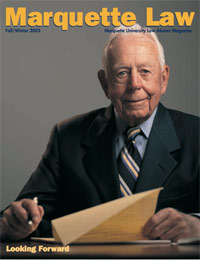Ralph Huiras, Hail and Farewell
 The area on the second floor of Eckstein Hall, running west to east from the elevators to the dean’s office, is the Huiras Lounge. It honors the extraordinary support that Ralph J. Huiras, L’41, gave to the building project — indeed, even though he made substantial gifts within the past decade to improve Sensenbrenner Hall, Ralph was, along with University Architect Tom Ganey, the earliest proponent of an entirely new home for Marquette Law School. Ralph felt especially strongly concerning the school, perhaps because it was his father’s alma mater as well: Peter M. Huiras graduated from Marquette’s law school in 1918, the same week that Ralph was born. The Huiras Lounge thus perpetuates Peter Huiras’s memory as well. There is much more that could be said concerning Ralph, who passed away this past weekend. Some of it has been said on past occasions, such as in this cover story of the law magazine several years ago or on the occasion of Ralph’s receipt of the Law Alumni Association’s Lifetime Achievement Award.
The area on the second floor of Eckstein Hall, running west to east from the elevators to the dean’s office, is the Huiras Lounge. It honors the extraordinary support that Ralph J. Huiras, L’41, gave to the building project — indeed, even though he made substantial gifts within the past decade to improve Sensenbrenner Hall, Ralph was, along with University Architect Tom Ganey, the earliest proponent of an entirely new home for Marquette Law School. Ralph felt especially strongly concerning the school, perhaps because it was his father’s alma mater as well: Peter M. Huiras graduated from Marquette’s law school in 1918, the same week that Ralph was born. The Huiras Lounge thus perpetuates Peter Huiras’s memory as well. There is much more that could be said concerning Ralph, who passed away this past weekend. Some of it has been said on past occasions, such as in this cover story of the law magazine several years ago or on the occasion of Ralph’s receipt of the Law Alumni Association’s Lifetime Achievement Award.
Beyond this, I wish to note, for the benefit of our students, how proud Ralph was of the Huiras Lounge. He forwent the opportunity to have the fourth-floor gallery bear the Huiras name, instead of the lounge. Ralph wanted his and his father’s memory to be both near the dean’s office (recalling his visit to Dean Francis X. Swietlik’s office in 1941 when he had been summoned to Washington, D.C. to join the FBI even before he could take his last exams) and — more importantly — where the students are and will be. It was a great privilege to know Ralph, to stand in the Huiras Lounge with him last month, and to be associated with his belief in and commitment to the future of Marquette University Law School.
